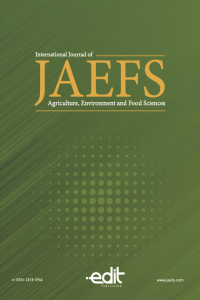Analysis of housewives’ knowledge levels and behaviors toward food waste and sustainable nutrition
Analysis of housewives’ knowledge levels and behaviors toward food waste and sustainable nutrition
Level of knowledge, Housewife, Food waste Sustainable nutrition, Turkiye,
___
- Alsaffar, A. A. (2016). Sustainable diets: The interaction between food industry, nutrition, health and the environment. Food science and technology international, 22(2), 102-111. https://doi.org/10.1177/108201321557202
- Aydin, F., Yildiz, S. (2011). Determination of Bread Consumption Habits and Consumer Dynamics in Sivas Province. Journal of Atatürk University Faculty of Agriculture, 42(2), 165-180.
- Burlingame B, Dernini S. Sustainable diets: the Mediterranean diet as an example. Public Health Nutrition, 2011; 14 (12A): 2285–2287. https://doi.org/10.1017/S1368980011002527
- Daysal, H., Demirbaş, N. (2020). Causes of household food waste and suggestions to reduce it: The case of İzmir province. Balkan and Near East Social Sciences Journal. 06 (03): 40-47.
- Demir, Y. (2020). A Study to Evaluate Individuals’ Perceptions of Household Food Waste. Black Sea International Scientific Journal, 1 (48), 10-26. https://doi.org/10.17498/ksea.750092
- FAO/WHO. Sustainable healthy diets-Guiding principles. Rome; 2019.
- FAO. (2012). Food and Agriculture Organization of the United Nations. Sustainable diets and biodiversity. Rome.
- Gilg, A., Barr, S., & Ford, N. (2005). Green consumption or sustainable lifestyles? Identifying the sustainable consumer. Futures, 37(6), 481-504. https://doi.org/10.1016/j.futures.2004.10.016
- Gülsöz S. (2017). Evaluation of the knowledge and practices of individuals aged twenty and over on sustainable nutrition: Başkent University Institute of Health Sciences. https://doi.org/10.31015/jaefs.2021.2.3
- Gustavsson J., Cederberg J., Sonesson U. (2011). Global Food Losses and Food Waste, Save Food Congress, 16 May, Düsseldorf.
- Kıyan, E. K., & İkizoğlu, B. (2020). Types of waste in the context of waste management and general overview of waste disposal in Turkey. International Journal of Agriculture Environment and Food Sciences, 4(4), 520-527. https://doi.org/10.31015/jaefs.2020.4.17
- Koksal, Eda & Bilici, Saniye & Dazıroğlu, Merve & Erdoğan Gövez, Nazlıcan. (2022). Validity and Reliability of the Turkish Version of the Sustainable and Healthy Eating Behaviors Scale. British Journal of Nutrition. 1-20. https://doi.org/10.1017/S0007114522002525
- Oral, Z. (2015). Practices for Food Waste and Prevention in the World and in Turkey, Ministry of Food, Agriculture and Livestock, General Directorate of European Union and Foreign Relations, EU Specialization Thesis, Ankara.
- Ozen G.U. (2019). Evaluation of Knowledge and Attitudes of Dietitians and Dietetic Candidates on Sustainable Nutrition, Hacettepe University Institute of Health Sciences, Ankara.
- Pelletier, J.E., Laska, M.N., Neumark-Sztainer, D., Story, M. (2013). Positive attitudes toward organic, local, and sustainable foods are associated with higher dietary quality among young adults. Journal of the Academy of Nutrition and Dietetics, 113(1):127-32. https://doi.org/10.1016/j.jand.2012.08.021
- Pieniak, Z., Żakowska-Biemans, S., Kostyra, E., Raats, M. (2016). Sustainable healthy eating behaviour of young adults: towards a novel methodological approach. BMC Public Health, 16(1):577. https://doi.org/10.1186/s12889-016-3260-1
- Rakıcıoğlu, N., Acar Tek, N., Ayaz, A., Pekcan, G. (2017) Food and Nutrition Photo Catalogue.Ankara.
- Stok, F. M., Renner, B., Clarys, P., Lien, N., Lakerveld, J., & Deliens, T. (2018). Understanding eating behavior during the transition from adolescence to young adulthood: A literature review and perspective on future research directions. Nutrients, 10(6), 667. https://doi.org/10.3390/nu10060667
- Tekiner, İ. H. , Mercan, N. N. , Kahraman, A. & Özel, M. (2021). An overview of food waste and loss in the world and in Turkey. Journal of Istanbul Sabahattin Zaim University Institute of Science and Technology, 3 (2), 123-128. https://doi.org/10.477769/izufbed.884219
- TÜBER, (2015). Turkey-Specific Food and Nutrition Guide, Hacettepe University, Faculty of Health Sciences, Department of Nutrition and Dietetics, Revised 1st Edition, Ankara.
- UNEP, (2021). United Nations Environment Programme Food Waste Index Report 2021. Nairobi, Retrieved from https://www.unep.org/resources/report/unep-food-waste-index-report-2021. (Accessed 05.11.2022).
- WHO, (2022). WHO STEPS Surveillance PART 3: Data Collection 3-5-1 Section 5: Collecting Step 2 data: Physical Measurements, Retrieved from https://cdn.who.int/media/docs/default-source/ncds/ncd-surveillance/steps/part3-section5.pdf?sfvrsn=a46653c7_2 (Accessed 05.11.2022).
- Yolcuoğlu, İ.Z., Kızıltan, G. (2021). Effect of Nutrition Education on Diet Quality, Sustainable Nutrition and Eating Behaviors among University Students. J Am Coll Nutr. Jul 30: 1-7. https://doi.org/10.1080/07315724.2021.1955420
- Yayın Aralığı: Yılda 4 Sayı
- Başlangıç: 2017
- Yayıncı: Gültekin ÖZDEMİR
The impact of hematite on the anaerobic digestion of cattle manure
Yasin ODABAŞ, Yasemin Dilşad YILMAZEL
Production of recombinant expansin and detection by SDS page analysis in Escherichia coli
Serap GÜNEŞ, Demet EKTİREN, Mehmet KARAASLAN, Hasan VARDİN
Valorization of shalgam juice plant waste for the production of carotenoids by Rhodotorula glutinis
Abdulkadir KESKİN, Melis FIRAT, Ayşe Ezgi ÜNLÜ BÜYÜKTOPCU
Evaluation of database and some soil characteristic of Kumkale Agricultural Enterprise soils in GIS
Yavuz Şahin TURGUT, Yakup Kenan KOCA
The effect of altitude on soil organic carbon content in semi-arid mediterranean climate
Tuğba ŞİMŞEK SEMERCİOĞLU, Ceren Ayşe BAYRAM, Gökhan BÜYÜK, Erhan AKÇA, Nilgün KALKANCI
Hüseyin GÜNGÖR, Mehmet Fatih ÇAKIR, Yağmur TURAN, Bahar GEDİK, Berkay Hakkı KANTAR, Ziya DUMLUPINAR
Analysis of the foundations of market gardening activity in the Commune of Athiémé (Benin)
Marcelle Agathe MONDE, Claude AHOUANGNİNOU, Djafarou ABDOULAYE, Kıkı YAWO DENİS LANDRY, Samuel MASSEDE, Agossou Brice Hugues TENTE
Samır MEDJEKAL, Ghadbane MOULOUD, Hani BELHADJ, Laid BENDERRADJI
